TURNING POINT
Barks
officially moved from Burbank to San Jacinto a
few days before his resignation in order to start
as a chicken farmer. He had actually bought the
place a couple of years earlier, but kept the
purchase a secret. In his letter of resignation
Barks referred to the estate as 'five acres
of Russian thistles', and it becomes obvious
that he was just about to install himself at the
new address, because he was not sure that the
mailman had 'found' him yet. He did, although
Barks typed in a slightly faulty address; he
wrote Ramona Blvd. instead of Ramona Drive...
In the same letter Barks also expressed the hope
that 'my farm and chickens will support me
while I build up an income from free-lancing
cartooning'. This was not to be, but,
luckily, Western got hold of him...
|
.
DELIBERATIONS
This is an excerpt from a 1972
interview: When I left the studio, I wanted
to get out to a drier climate, because air
conditioning was knocking the hell out of my
sinuses. I was having hay fever and colds all the
time. The only way I could think of to make a
living was to have chickens or something around.
You couldn't plant an orchard and expect it to
make something right away, and I knew that
chicken business should pay. During all those war
years the country was going to need to have eggs.
It seemed like a quick way of getting into
something I could make a living in.
It didn't last very long, because I was doing so
many comic books that I didn't have time to take
care of the darn chickens. They made me a little
profit before I phased them out, but I just found
that i couldn't care of chickens and write and
draw. Comics were the ones that paid me more
money.
|
.
DECISION
This is an excerpt from a 1993
interview: I left the Disney Studios in
November 1942 because I was in poor health and
had to leave. I had found that the hot sunshine
of the desert areas east of Los Angeles cleared
up my allergies. It was a reckless gamble to
leave a 100 dollars a week for the fragile
security of a chicken farm, but I hoped to get
into comic book work on a freelance basis as a
sideline occupation.
As luck would have it Barks succeeded. The very
same month he left Disney Western Publishing
launched their new concept in the WDCS
series - new material instead of reprints of old
newspaper strips. Barks was contacted out of the
blue. How lucky can one be???
|
.
FAILURE
In the early years of his comic book
life Barks was often insecure about his work.
Sometimes he looked upon himself as 'a failed
chicken farmer'..
|
.
ODD JOBS
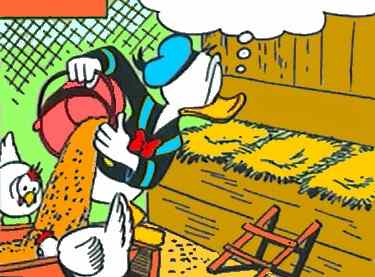
Until he began
earning a living in the comic book industry,
Barks worked as farmhand, machinist, grape picker,
cartoonist, train car repairman, writer,
machinist, in-betweener, sawmill worker, plum
picker, carpenter, print shop assistant, oil
worker, cattle station worker, producer, gagman,
painter, muleskinner, comic book artist, editor,
factory worker, rivet heater, cowhand, logger,
farmer, storyteller, and - chicken farmer.
The knowledge he picked up from all these odd
jobs proved to be valuable when Barks wrote his
duck stories, because when he had Donald perform
certain jobs, Barks knew what he was writing
about; he had been there himself!
Here are some examples of stories
that were more or less influenced by Barks' own
professional life: WDCS055 'The Cow-Puncher'
(cowhand), WDCS190 'The Swimming Race' (plum
picker), WDCS238 The Dog Sitter (cattle
station worker), WDCS267 Log Jockey
(logger), and WDCS146 'Omelet' (chicken
farmer).
|
.
FIZZLE
I was a fizzle as a cowboy, a
logger, a printing press feeder, a steelworker, a
carpenter, an animator, a chicken grower, and a
barfly. Perhaps that all helped in writing my
stories of the ineptitudes of poor old Donald.
|
.
RESIDENCE
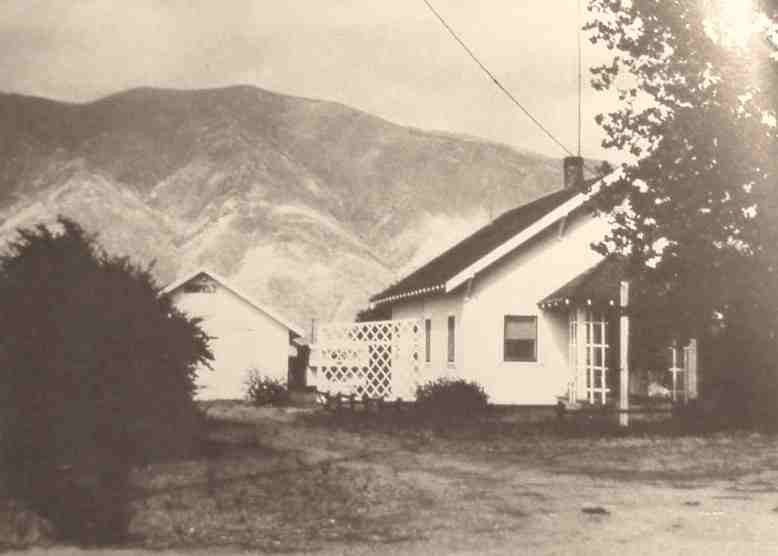
The residence and chicken farm in
the San Jacinto Valley. Barks would later 'complain'
that the breathtaking view of the nearby mountain
range from his studio window had cost him
hundreds of man hours...
|
.
CLARA
The couple moved to San Jacinto, and
Clara worked with Carl when he began his comic
book career:
I taught her to black in my stuff, that is,
put in the solid blacks with the brush, and she
did that for me for several years (she also
inked the borders around the panels - Editor's
remark). But as she became more and more of
an alcoholic, she got to where she would get on
belligerent spells and try to tear up a bunch of
my drawings. In fact, that first Uncle Scrooge (FC0386
Only a Poor Old Man - Editor's remark)
I drew that in a motel down in Los Angeles, where
I had taken refuge. She would have torn up my
drawings - and probably chopped me up with a meat
cleaver or something - on one of her big drunks.
It is unclear if - and how much -
Clara helped with the chicken farming, as Barks
never mentioned her positive sides while they
lived in San Jacinto, but it is plausible that
she at least lent a hand on an irregular basis.
|
|
|
CONSIDERATIONS
This is an excerpt from another 1972
interview: Choosing chickens was a matter of
economics. I mean, I didn't care much for chicken
farming. I wouldn't have gone into the dairy
business, for instance, because that is really
tying you down. You've got to milk cows at a
certain hour of every day. With chickens you're
pretty much tied down, too, but you needn't be
there at a specific hour to get the eggs. You can
leave them to lie there until the next day and
gather them up. It doesn't cost very much to go
into raising a few chickens, but going into any
other type of farming is very expensive.
|
.
FAVOURITE STORY
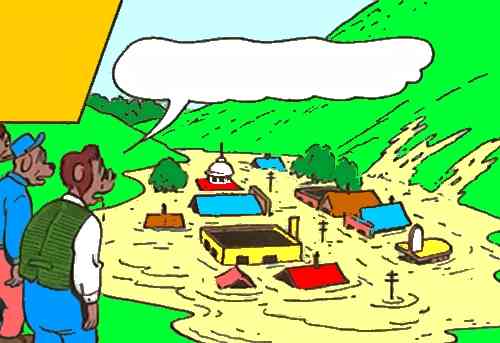
Barks considered his story WDCS146 'Omelet'
from 1952 as one of his funniest 10-pagers. It
was the short story he recalled most frequently,
in which Donald worked as a chicken farmer and
everything turned out wrong to such an extent
that the unfortunate town in which the story
takes place was renamed Omelet:
Of the 10-pagers, the story I like best is the
one in which Donald has a chicken farm and stacks
the eggs so high that when an earthquake shakes
them loose they cover the town on the valley
floor and have to be burned.
|
.
DETERMINATION
This is an excerpt from a 1997
interview: I just had to get out of the
Disney Studios, because I had such terrible sinus
trouble, and I would have become an invalid if I
stayed there and worked. I found that going out
in the hot desert sun down around San Jacinto I
would feel better. So when I left the studios, it
was to go get out of that miserable air-conditioned
climate and get out in the open hot sun and cook
all the bugs out of me. It worked. That hot sun
began to cook some sense into my head. I left
with no means other than raising chickens.
|
.
REVERENCE
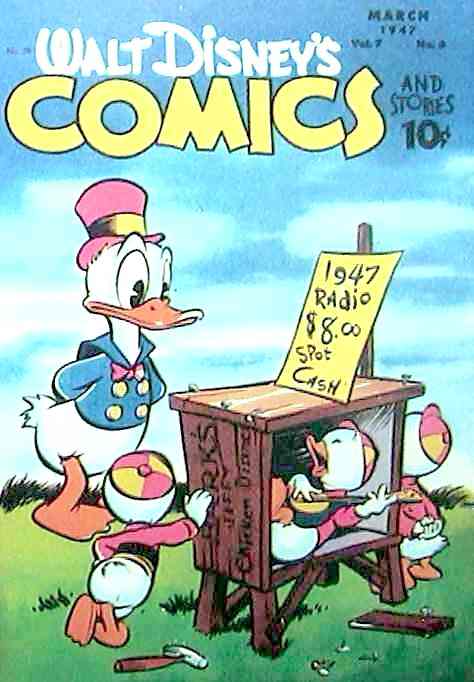
Fellow artist
Walt Kelly made a clear reference to his
colleague Carl Barks and his chicken farm in San
Jacinto on the front cover for WDCS078
from 1947. The text on the side of the box reads:
BARK'S JIFFY CHICKEN DINNER.
Apart from the erroneous use of the
apostrophe (Bark's instead of Barks') in the text,
it is somewhat puzzling that Kelly should have
made the in-joke years after Barks actually
started his chicken farm, because at that time he
had long abandoned the project. (It should be
added, though, that a number of Kelly's covers
were actually first published years after his
resignation from Western Publishing in 1948
suggesting a fair amount of 'inertia'). But at
the time Barks was a rising star who paid monthly
visits to Western in order to personally deliver
his stories (see more HERE), and it can be speculated
that the art director, Carl von Buettner, simply
decided to pay tribute to his star artist by 'digging'
up an old cover from the discarded drawings
archives. Only thing needed was to alter the year
stated on the sales sign...
|
.
GARÉ
Garé, who 12 years later became
Carl's third wife, first met Carl briefly in 1942:
She had seen a newspaper article about a
nearby chicken farmer who dabbled with the
drawing of some comic books and she went out
there to see if he might have any work for her.
She came over to see me at a time when my
second wife and I were in San Jacinto. I was
drawing the comic books and a little article had
been printed about me in the newspaper, about how
I was working on duck comic strips, and I guess
Garé had heard about it, and she thought, maybe
I might have some work that she could help out.
She was a graduate of art school in Boston and
she needed some kind of employment, so she could
use some of her talent.
She came over and talked and asked about it. I
thought it all over, and I thought, well, do I
want to take on the responsibility of an
assistant, and how much work could I provide for
this girl, if I did? And so I handed her a bunch
of duck model sheets and told her to practice on
those and see what she could do in the way of
inking and so on. She tried it out and let me
know that she found it much too difficult.
Shortly after that she got a job down at
McDonnell Douglas, where they were building
airplanes. The war was on, and she was in the
drafting department, lettering the drafting pages.
|
.
JUST DUCKY
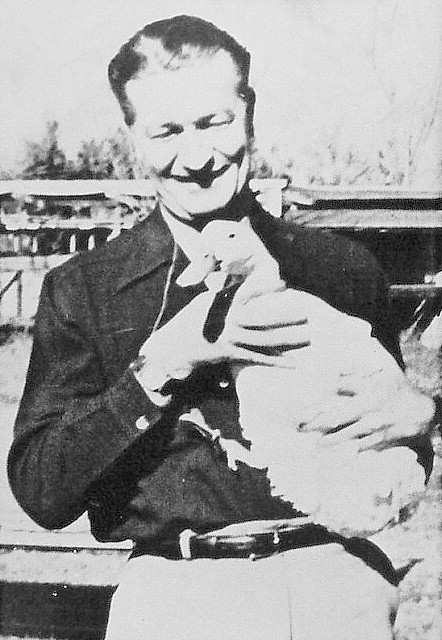
This is the only surviving photo of Barks at his
chicken farm. In his arms he is holding a - duck...
|
|

